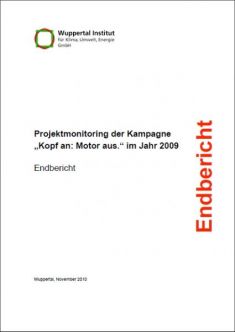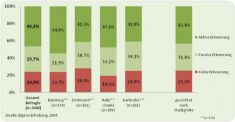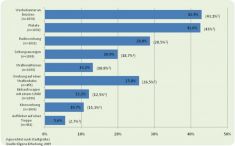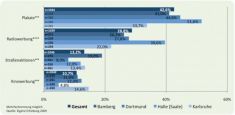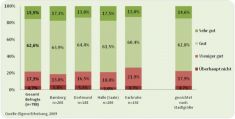Evaluation of the campaign "Brains on: Engines off"
Location:
Germany: Bamberg, Dortmund, Halle (Saale), Karlsruhe
Project description:
Starting situation and evaluated campaign
In the framework of the programme ‘Zero emission mobility’ the campaign ‘Brains on: engines off. For zero carbon dioxide over short distances’ has taken place in 2009. Four cities, Bamberg, Dortmund, Halle (Saale) and Karlsruhe out of 94 applicants have been selected for the implementation. Criteria were the quality of the realisation concepts, the existing walking and cycling infrastructure and the acceptance of non-motorised transport modes in the cities. And although the cities are quite heterogeneous with regard to the number of inhabitants, their mobility behaviour and the local settings, they share a good prognosis for the effectiveness of the campaign. In 2010 five more cities were selected to join.
You can find the description of the campaign here.
Objectives of the evaluation
The goal of the project, which received funding from the national initiative for climate protection, is an increased modal share of zero emission mobility; precisely, a doubling of the percentage of trips made on foot or by bike.
The evaluation should find out whether the campaign “Brains on: Engines off” can significantly contribute to reach this goal.
Evaluation concept and methods
The ex post impact evaluation covered three areas:
- Citizens’ awareness and rating of the campaign (asking those who had a car or were at least occasionally co-drivers)
- Appraisal of potential impacts of the campaign on people’s mobility behaviour
- Awareness of the campaign among stakeholder who were professionally involved with transportation
- Estimation of traffic-related impacts of the campaign and the resulting reduction in CO2 emissions
Representative telephone survey
During the last phase of the campaign in August 2009 a representative telephone survey with citizens has been carried out in all four cities. The statistical population were persons over the age of 18 from all households with landline telephone connection. 300 citizens in each of the cities have been asked; altogether, 1,200 interviews have been made. 154 of these said they never have a car at their disposal. Therefore, the number of valid interviews had to be corrected to 1,046.
The overall results have been weighted, as the 300 interviewees represent a different percentage of the population in each of the cities. The questionnaire encompassed 15 thematic questions plus six socio-demographic questions. Interviews took 15 minutes on average. A pre-test was made with approx. 50 persons.
The questionnaire focussed on four aspects:
- Awareness and rating of the campaign
- Focus of the awareness
- Associations with the campaign
- Impacts on individual mobility behaviour
The interview guideline (in German) can be found in the annex (p. 139) of the monitoring report.
Mobility behaviour and modal split
Mobility behaviour and modal split have been appraised through telephone interviews and using secondary data (MiD 2008).
Media coverage of the campaign
Media clippings from German newspapers have been collected by specialised agencies throughout the entire runtime. Overall, there were 441 reports: 239 online, 34 radio broadcasts, two TV reports, twelve article in thematic magazines, 150 news articles in local and regional papers and four reports in other media. The media coverage has been analysed quantitatively and with regard to content.
Expert interviews
Between November 2009 and February 2010 four to five expert interviews have been carried out in each of the four cities. Experts were politicians, civil servants, and representatives from associations and from the media. The interview guideline (in German) can be found in the annex (p. 153) of the monitoring report. The aim of these interviews was to find out more about the acceptance of the campaign among these groups. Each interview took between 30-60 minutes. The guiding questions focussed on the content of the campaign as well as on the implementation and effectiveness of it.
(Source: Wuppertal Institut 2010, Project monitoring of the campaign "Kopf an: Motor aus." Final report)
Target group of the evaluation:
- Politicians
- Administration
- Contractors: Fairkehr, Velokonzept
Funding:
Confidential
Organizations responsible for the project:
Funding body: German Federal Ministry for the Environment, Nature Conservation and Nuclear Safety
Contractor: Wuppertal Institut
Project term:
July 2009 - November 2010
Documentation:
The monitoring report (in German language) can be found here.
Contact person:
Project management evaluation (contractor)
Wuppertal Institut für Klima, Umwelt und Energie GmbH
Döppersberg 19
42103 Wuppertal
info@wupperinst.de
Internet: www.wupperinst.org
Awareness of the campaign among car users in participating cities;
green: active awareness
light green: passive awareness
red: no awareness
© Wuppertal Institut
Awareness of single elements of the campaign;
blue: active awareness
light blue: passive awareness
© Wuppertal Institut




